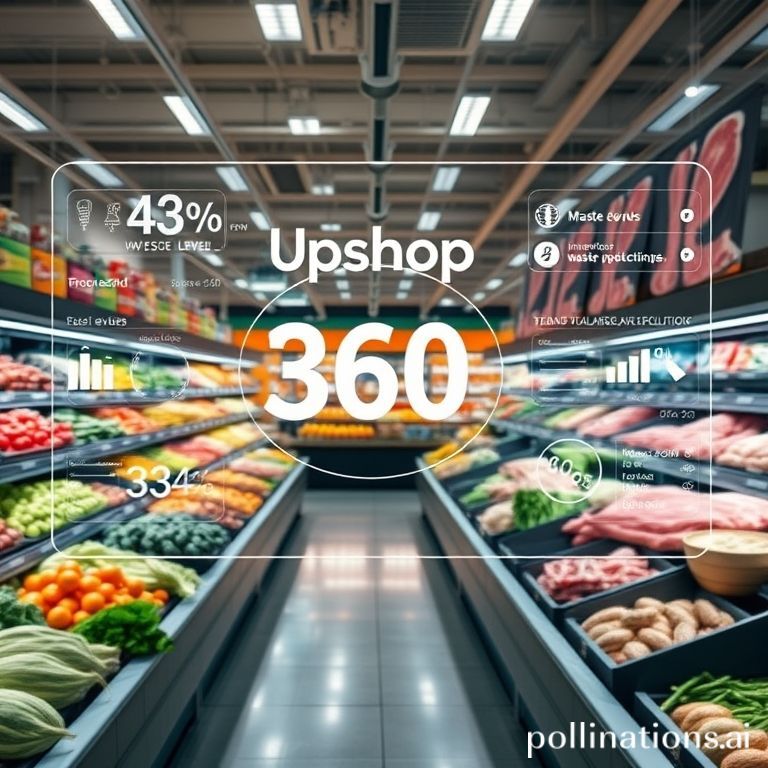Upshop 360: AI Solutions for Grocery’s $473B Waste Problem

The global grocery industry faces a persistent and economically significant challenge: food waste. Annually, an staggering $473 billion in value is lost, representing nearly 38% of the total supply. This enormous financial drain not only impacts retailers' profitability but also has wider environmental and societal implications. In response to this critical issue, Upshop, a prominent software-as-a-service (SaaS) platform tailored for food retailers, has introduced a groundbreaking solution: Upshop 360. This innovative platform represents a unified operating system designed to embed artificial intelligence across the entire spectrum of a grocery store's operational data, thereby providing an "AI-powered cockpit" for enhanced decision-making.
Transforming Grocery Operations with AI
Upshop 360 is more than just a data dashboard; it is a sophisticated system engineered to offer actionable direction to grocery retailers. As articulated by Upshop CEO Mike Sanders, "Retailers don’t need more dashboards, they need direction." The platform's core strength lies in its ability to apply AI to every facet of grocery operations, empowering leaders to "see, decide and act—faster than problems pile up." This proactive approach is crucial in an industry characterized by high volumes, complex supply chains, and perishable goods.
Key Features and Benefits of Upshop 360
The AI-powered cockpit offers a comprehensive overview of store-level activities, enabling grocers to:
- Optimize Replenishment: By analyzing sales data, historical trends, and predictive analytics, Upshop 360 can forecast demand with greater accuracy, ensuring optimal stock levels and minimizing overstocking or stockouts.
- Mitigate Waste Through Proactive Markdowns: The system identifies products nearing their expiration or optimal freshness window, prompting timely markdowns. This strategic intervention helps retailers recover value from items that would otherwise become waste, directly addressing the $473 billion problem.
- Direct Associate Tasks for Margin Enhancement: Upshop 360 intelligently assigns and prioritizes associate tasks based on real-time operational needs and potential margin impact. This ensures that staff efforts are focused on activities that yield the highest return, from merchandising to inventory management.
The emphasis on fresh food departments is particularly salient. These sectors typically generate significantly higher margins, ranging from 20% to 45%, compared to the modest 1% to 7% seen in center-store packaged goods. Consequently, achieving precision in perishable management has become an indispensable element for both profitability and sustained competitive advantage in the modern retail landscape.
The Economic Imperative: Addressing Food Waste
The scale of food waste is a pressing concern for the grocery sector. With nearly 38% of the supply chain's value – equivalent to $473 billion – being lost annually, the economic rationale for implementing advanced waste reduction strategies is undeniable. The impact of even marginal improvements is substantial; a mere 1% increase in fresh efficiency can translate into millions of dollars in additional profitability for a chain operating 100 stores. This highlights Upshop 360's potential to deliver significant financial benefits.
Beyond the direct financial gains, reducing food waste also contributes to sustainability goals and improves resource utilization, aligning with growing consumer expectations for responsible business practices. By providing tools that enable data-driven decisions at every level, Upshop 360 is positioned to revolutionize how grocers manage their most vulnerable and valuable assets.
Navigating Current Market Challenges
The introduction of Upshop 360 comes at a critical juncture for grocery retailers. The industry is currently grappling with a confluence of challenges, including shifts in consumer spending habits, persistent supply chain disruptions, and the escalating impact of tariffs. Consumers are increasingly facing "empty shelves and rising prices," with tariffs often cited by retailers as a primary cause. A recent PYMNTS Intelligence report, "Stock Out. The Impact of Tariffs on Consumer Product Prices and Availability," revealed that 22% of consumers, and a notable 31% among paycheck-to-paycheck households, were unable to purchase essential food items due to unavailability.
In response to these economic pressures, consumers are making discernible trade-offs in their grocery choices. For instance, there has been a noticeable surge in sales for more economical meal solutions, such as Hamburger Helper. This trend underscores a broader consumer behavior where families endeavor to manage rising costs for staples like beef and other proteins by opting for lower-cost prepared mixes, thereby maintaining dietary normalcy without excessive financial strain. Upshop 360's capabilities in optimizing inventory and predicting demand can help grocers adapt to these evolving consumer behaviors and market volatilities, ensuring better stock availability and competitive pricing.
Conclusion
Upshop 360 offers a comprehensive and intelligent solution to one of the grocery industry's most pressing issues: food waste. By harnessing the power of artificial intelligence, the platform provides retailers with unprecedented insights and actionable strategies to optimize operations, enhance profitability, and navigate complex market dynamics. In an era where efficiency, sustainability, and consumer satisfaction are paramount, Upshop 360 represents a significant leap forward in digital transformation for the food retail sector, promising to reshape how groceries manage their extensive and intricate ecosystems.
